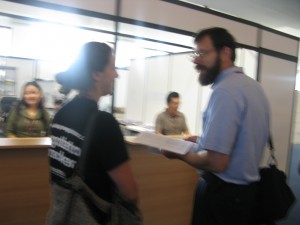And Now We Wait
Posted on 04. Dec, 2010 by astark in U.S.A.
Negotiators are reassembling in large plenary halls today in what is known as “informal stocktaking sessions,” to review the progress that small breakout groups have made so far. These sessions mark the halfway point of the negotiations. Yet there is not much to report right now, good or bad. Despite hints that negotiators have made progress on several issues over the past week, and also hit significant stumbling blocks, no one can say for sure what has happened with the negotiating text. For one thing, most of the small breakout talks, called contact groups, have been closed to NGO observers in Cancun, meaning that it is very difficult to know what has happened inside the meetings. Members of the U.S. delegation continue to remain tight-lipped at briefings, refusing to discuss the specifics of top-secret bilateral meetings or the discussions that are happening behind closed-doors. Many negotiators also refuse to go on the record with their statements.
Now, in the quiet halls of the resort hotel where the negotiations are taking place, everyone is waiting for a surge of events, predicted to begin as early as this afternoon when negotiators expect to get hold of a newly revised version of the LCA draft text originally introduced by AWG-LCA Chair Margaret Mukahanana-Sangarwe. The original text sought to draw a compromise on some of the most contentious issues under debate over the past year, although it left some of the key sections, such as the discussion over MRV, blank. Now, everyone- NGO observers, reporters and negotiators themselves- is waiting for the revised text, which will give us a better indication of where the discussions stand and whether negotiators have been able to compromise on the most divisive questions still left on the table. For now, every negotiator that I’ve spoken to about what to look for in the next several days of negotiations has said something along the lines of “look for the new text,” implying that we may not know more before it is released.
There’s also a second mysterious text (also known as a “non-paper,” go figure) that will be thrown into the mix, known around here as the “Mexican text.” This text is being developed by the Mexican presidency of the COP, as Mexican delegates consult with other negotiators and work to pull together their own version of a compromise text. This is a task traditionally undertaken by the presidency at the UNFCCC after the first week of negotiations. But this year the Mexicans are taking extra precautions in their approach, since last year in Copenhagen, Danish negotiators were charged with only consulting with the most powerful nations and creating a text through an undemocratic and inequitable process. Mexican officials and the UNFCCC Secretariat, keen to be viewed as acting in an inclusive and consultative way, have vigorously denied rumors about a “secret” Mexican text, and have sought to reassure negotiators that the process of accumulating the text has been as consultative and transparent as possible. Executive Secretary Christiana Figueres said yesterday at a press briefing, “let me be unequivocal, the text that does exist is the text everybody has seen.”
The real excitement will begin on Tuesday, when high-level ministerial discussions begin. At this point, negotiators will have scrambled to pull together a text that is mostly coherent, and will pass their work on to higher-level ministers from their national governments who will be tasked with ironing out the final issues and details and, with a bit of luck, signing on to an agreement. Todd Stern will be the head of the U.S. high-level delegation, and will be accompanied by Secretary of Energy Dr. Steven Chu, the Secretary of Agriculture Tom Vilsack and the Chair of the White House Council on Environmental Quality Nancy Sutley.
It will be up to these ministers to reach agreement on the issues that negotiators have been struggling over since 2007, when the Bali Action Plan envisioned a path towards a binding climate deal. Let’s hope that they are up to the task.
Translate this page:
Negotiator Tracker - Alex Stark
Alex Stark joins the project from Washington DC, where she's focused on legislation addressing drivers of violent conflict around the world, including the effects of climate change. Tracking the US negotiators and getting the word out about action inside the UNFCCC combine her passions for activism, sustainable development, conflict prevention and US foreign policy. read more»
Read more of Alex's posts here.
Follow Alex on twitter @AlexMStark







